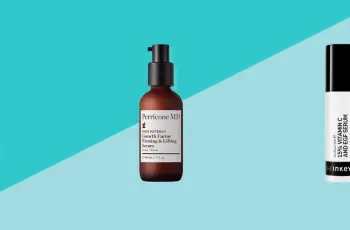
Of all the active ingredients in skincare, Vitamin C is definitely a favorite for those who want a youthful, radiant complexion. Due to the many benefits of Vitamin C serum for the skin, you’ll find that once you apply it to your skin, you’ll never stop. That’s why today I’m telling you about the benefits of Vitamin C serum and how they fight acne.
What Does Vitamin C Serum Do for Your Skin?
Vitamin C serum contains a combination of vitamins, also known as ascorbic acid and L-ascorbic acid, which belong to the alpha hydroxy acid (AHA) family. They are able to remove dead skin cells that accumulate in the outer layer of the skin, which can cause problems such as pimples, uneven skin texture and dull skin tone, flaky, dry skin.
It also helps the skin fight dark spots and acne scars, which can become more pigmented due to other environmental aggressors such as UV rays and pollution. The antioxidant properties of Vitamin C protect the skin from free radical damage and skin stress. Dark spots and acne scars are significantly reduced and less noticeable as vitamin C slows down the production of melanin, which seeps into damaged holes in the skin layer. Think of vitamin C as a giant plug that prevents more pigment from escaping.
Important benefits of vitamin C for skin:
It reduces the appearance of sun damage, such as superficial dark spots and acne scars.
Can help visibly brighten your complexion and correct dull and blotchy areas of skin.
Contains antioxidant properties to help prevent irritation, redness, and inflammation caused by environmental skin stressors.
May help speed up the skin’s natural healing process.
This article outlines the key benefits of vitamin C and how it can treat the skin. However, as with all AHAs, sensitivity to UV rays is increased, so it’s important to use a product with SPF 30 or higher every day to protect your skin from further damage. You can find out more about ascorbic acid and L-ascorbic acid in our dedicated guide to the skin care benefits of vitamin C.
Does vitamin C serum cause pimples?
Actually, it can! If you find your skin is experiencing breakouts and any type of blemishes (from blackheads to pimples), vitamin C can help fight them. The exfoliating action helps keep pores free of bacteria, product buildup, or dirt, preventing blackheads and whiteheads. For more active, larger pimples, vitamin C can reduce inflammation and speed up the healing process of skin damage caused by unnecessary popping of pimples. You’ll also find that vitamin C can also help correct skin tone and even eliminate hyperpigmentation or dark spots if you give in to temptation and pop your pimples.
Vitamin C can cause pimples and breakouts, but that’s only half the story. If you’re experiencing breakouts or spots, it could be due to other ingredients mixed into the serum’s formula.
When looking for a product, it’s best to consider your skin type and pay attention to which ingredients will help your skin thrive without causing imbalance or breakouts. For example, oily skin types should avoid shea butter, while dry skin types should avoid salicylic acid.
When should I apply vitamin C serum to my face?
When it comes to applying skincare products, the order can be a little confusing. I’ve mentioned this before on our blog, but the easiest way to remember is to go from thinnest to thickest. This results in the need to apply your serum to your skin after you’ve applied an acid toner or chemical peel, but before you moisturize. This allows the serum’s rich active ingredients to penetrate the skin without having to compete with the barrier created by your moisturizer.
Many skin experts believe that applying a vitamin C serum as part of your morning routine is the best way to wake up and brighten your skin, so that the glow from using vitamin C is visible throughout the day. Others have also found that vitamin C serums are more effective at night because there are no daily distractions interfering, which means the antioxidant benefits can kick in faster and produce better results.
Does Vitamin C Help Fight Dark Spots?
Vitamin C has been praised for its ability to reduce the appearance of dark spots on the skin. Because the damage occurs in the lower layers of the skin, dark pigmentation is one of the most difficult skin issues to address. Luckily, with the exfoliating and protective properties of ascorbic acid, you’ll see a significant improvement in the overall appearance of your complexion in 4-6 weeks. While the damage that caused the dark spots can’t be completely reversed, you can make them less noticeable. For example, imagine a white tablecloth with a peppercorn on it. If you grind the peppercorn into a powder, this phenomenon will be less noticeable. If you imagine this, you will understand how vitamin C can reduce the appearance of dark spots, but it does not completely eliminate them.
What are the side effects of vitamin C serum?
Some people say that when they first apply vitamin C serum to their skin, they feel a stinging or slight tingling sensation. This is considered a normal reaction and should not last more than 2-3 seconds. If you experience any of the following reactions, it is recommended not to use vitamin C on your skin because it is too strong.
Rash
Scaling
Redness
Itching
Tightness of the skin
Severe dryness
As we always recommend, when using new skin care products, you should consult your doctor, dermatologist or skin care expert to make sure the ingredients and formula are safe for your skin. If you want to try another AHA for chemical peels, you can always learn more about what AHAs and BHAs are and how they benefit your skin on our website.
Don’t miss more skin care tips and expert advice on our YouTube channel! Click the “Subscribe” button to visit our green couch. You won’t regret it!


